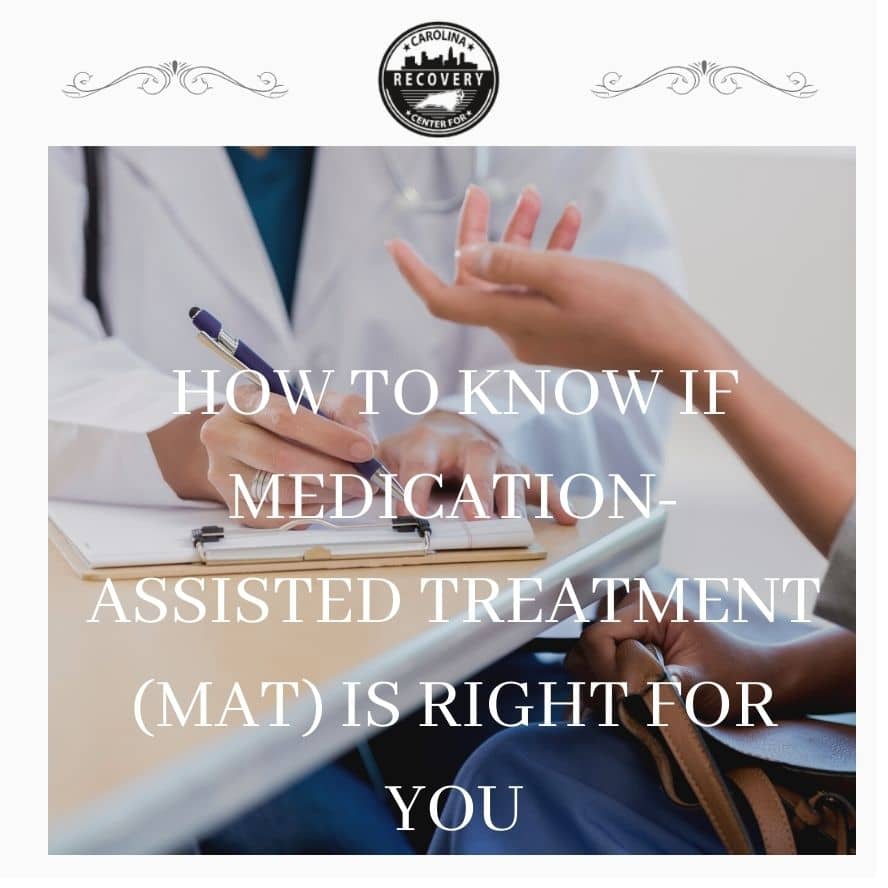How to Know if Medication-Assisted Treatment (MAT) is Right For You

Medically Verified: 2/1/24
Medical Reviewer
Chief Editor

All of the information on this page has been reviewed and verified by a certified addiction professional.
Getting sober and staying sober are no easy tasks. Many people relapse one, two, three, or more times before they finally achieve long-term sobriety. While relapse is considered a normal part of the disease of addiction, there are certain tools that can reduce the risk of relapse and improve treatment outcomes. One of these tools is medication-assisted treatment (MAT).
Medication-assisted treatment (MAT) is an integrated approach to addiction treatment that combines FDA-approved medications with counseling, behavioral therapy, and peer support groups. Whether you have struggled with staying sober before or have been hesitant to start your recovery because you don’t think you can stay sober, medication-assisted treatment may be able to help.

Here are 5 signs that medication-assisted treatment is right for you.
1. You’re Addicted to Alcohol or Opioids
Currently, the FDA has only approved medications to treat addictions to alcohol and/or opioids. There are no medications approved for the treatment of benzodiazepine, cocaine, or meth use disorder. As a result, if you are struggling with alcohol or opioid use disorder and are seeking treatment, you may qualify for MAT.
Medications approved to treat opioid use disorder include:[1]
- Methadone
- Buprenorphine
- Naltrexone
Medications approved to treat alcohol use disorder include:
- Naltrexone
- Acamprosate
- Disulfiram
Each of these medications should be used in combination with a comprehensive treatment program. Remember, medications do not cure addiction–they simply improve treatment outcomes in qualified individuals.
2. You’ve Tried to Get Sober Before But Cravings Got the Best of You
Everyone experiences cravings when they get sober, but some people’s cravings are stronger than others. Similarly, some people stop having cravings after the first few weeks, while others have cravings for several months or years. While a qualified substance abuse treatment center will teach you coping skills to deal with cravings, establishing these coping skills can be a slow process. Nothing happens overnight.
Lingering cravings can make you feel defeated and tempted to use drugs or alcohol rather than continue with your sobriety, but medications used in MAT are designed to alleviate drug and alcohol cravings, thereby preventing relapse.
If you’ve been to rehab before but found that your cravings were too powerful to deal with alone, medication-assisted treatment (MAT) in North Carolina may be right for you.
3. You’re Ready to Commit to Your Recovery
MAT requires so much more than simply taking medication. Medication is meant to alleviate withdrawal symptoms and cravings, not to design a roadmap for recovery. Figuring out your recovery is up to you–you must work closely with your therapist to heal the root causes of your addiction, develop healthy coping skills, and establish a relapse prevention plan.
If you’re looking for the easy way out or you think a prescription can heal you, MAT may not be right for you. MAT is only effective when combined with counseling and behavioral therapy–both of which you must be ready to participate in and commit to.
4. You Have Left Rehab Early or Against Medical Advice (AMA) in the Past
Between uncomfortable symptoms of withdrawal and nagging drug cravings, keeping your feet planted at your rehab center can be challenging. You may have found yourself tempted to leave rehab early so you could get high or drunk again. Or, maybe you’ve been to treatment before but were unable to complete the entire program.
If this sounds like you, medication-assisted treatment (MAT) may be advantageous. Studies show that MAT improves treatment retention rates better than treatment programs that do not utilize medications.[1] The longer you stay in rehab, the better your treatment outcomes will likely be, as 90 days or more is usually recommended for people struggling with substance use disorder.[2]
5. You’re Addicted to Opioids While Pregnant
Struggling with addiction while pregnant can affect both the mother and her unborn child. Expecting mothers are often hesitant about seeking treatment because they don’t want child protective services to get involved. However, babies born to mothers struggling with opioid addiction may experience neonatal withdrawal syndrome right out of the womb and other life-threatening health conditions.
The good news is MAT has been shown to improve birth outcomes in women who have substance use disorders and are pregnant.[1] If you are pregnant and struggling with addiction, don’t be afraid to reach out. Getting help is the best thing you can do for yourself and your baby.
Find Out if Medication-Assisted Treatment (MAT) in North Carolina is Right for You
Medication-assisted treatment (MAT) may not be right for everyone. You should never take a prescription drug that is not prescribed to you as doing so can be dangerous. The best way to find out if MAT is right for you is to call and speak with a qualified addiction specialist.
At Carolina Center for Recovery, our dedicated admissions team is available 24 hours a day to verify your insurance, assess your situation, and help you choose the right recovery program for you. Call now to get started.
References:

